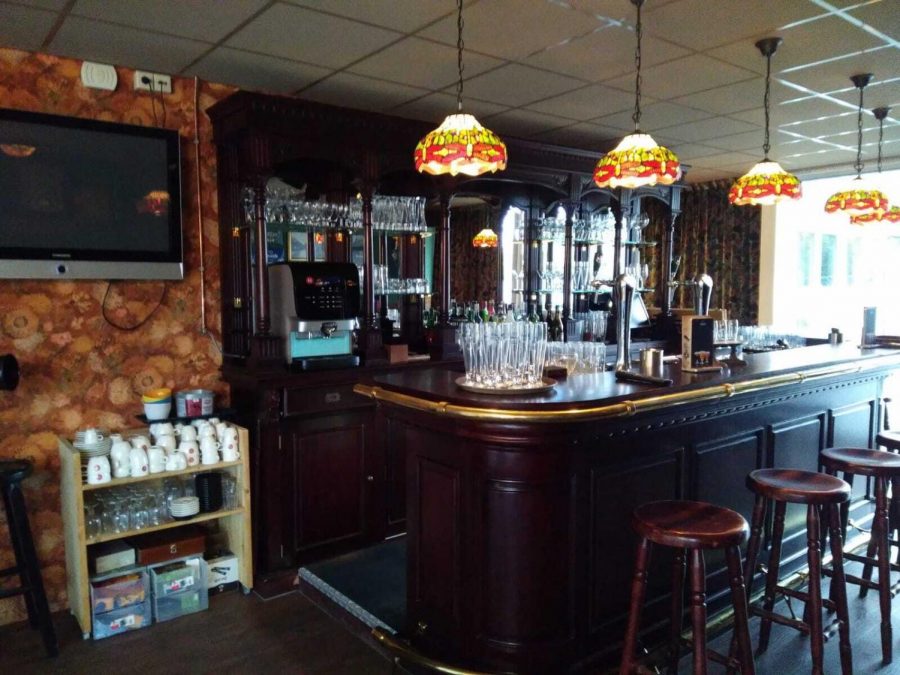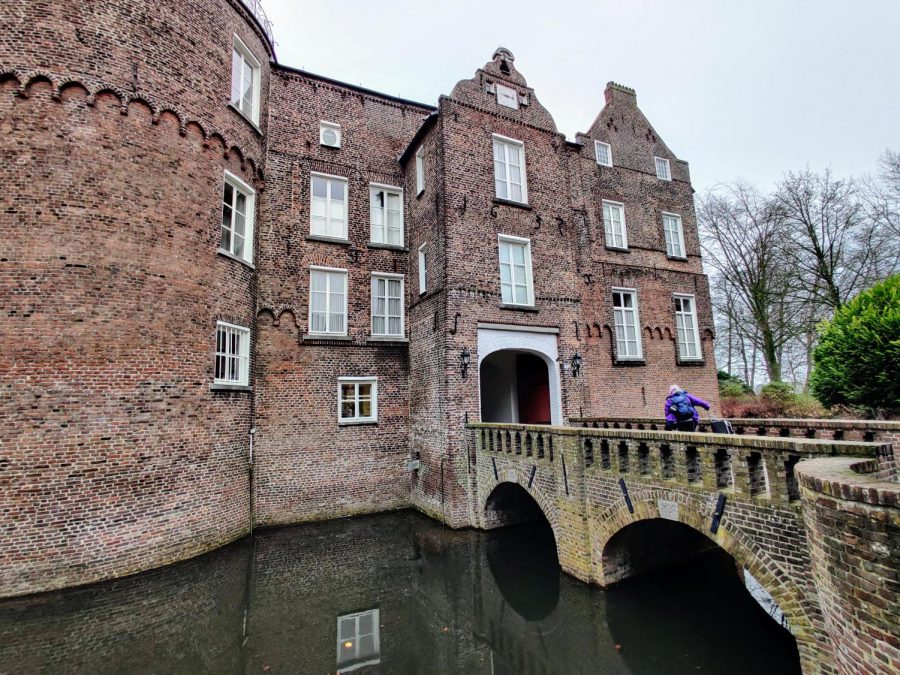Nearly 3,500 miles away from Boston, a towering castle is quiet. Thanks to the coronavirus pandemic, the dorms at Kasteel Well have sat empty for nearly a year—and the neighboring Dutch village lies largely shuttered.
Emerson students have been missing from the college’s flagship satellite campus since March 2020, when the COVID-19 outbreak in Europe compelled the college to repatriate them back to Massachusetts mere days before students vacated the Boston campus as well. In their absence, Well aan de Maas, a small town in the southernmost province of the Netherlands named for the River Meuse that dwarfs it, has faced a months-long lockdown that has effectively closed much of its tourist (and student-based) economy.
“Well is no exception to the rest of the Netherlands or many other parts of the world,” Dulcia Meijers said. “It’s bare.”
Meijers, the executive director of Emerson College’s European Center, has been managing the empty campus since Emerson students were sent home on Mar. 6. She said the absence of students from Well, a bucolic town with abounding cycling paths and expansive pastures, has been acutely felt.
“Our students would go nonstop to the bakery shop, the variety shops, the cafes, and the snack bars,” Meijers said. “There’s a lot less of that traffic now.”
Meijers noted that the Netherlands, like most of the world, has been under a strict lockdown for months in an effort to curb the spread of the pandemic. Barring a reopening between June 1 and Oct. 15, the country’s bars, restaurants, and many other establishments remain closed, and a nationwide 9:00 p.m. curfew was recently extended to at least March 3, according to Reuters.
“The situation in Europe isn’t going well,” Meijers said. “It’s perhaps a little bit less dramatic in Europe [as opposed to in the United States], but it’s still serious enough to maintain the lockdown.”
Onder de Linden, a cafe and bar at MFC de Buun (a mixed-use shopping mall and community center in Well), was once a hotspot for Emerson students studying at the restored 14th-century castle. Aside from the reopening period, it has been closed since Mar. 18—shortly after students left.
“We are missing the students, of course,” Sjaak Janssen, the bar’s owner, said. “The whole village misses them. It’s been a terrible time.”
Onder de Linden is usually a prime attraction for the international student population at the nearby castle—both because of the Netherlands’ 18-year-old drinking age and the bar’s weekly “American Night” catered specifically to them.
“The concept is like bringing a little bit of America to Holland,” bartender Jordy Dura said. “It’s really fucking amazing.”

Interior of Onder de Linden bar in Well, Netherlands.
Dura described the atmosphere during the bar’s American Night as electrifying, in large part due to the Emerson students.
“They go for three [sic] months, and they want to get as much out of it as they can,” he said. “Everyone is dancing on tables. It’s only eight weeks or seven weeks, but every Wednesday I have the feeling that it is the last time.”
“Well is a little village with 2,500 people—super, super small.” Dura continued. “For this town—and for me and my friends, who are all around 21, 22, who go to Dutch pubs where everyone is Dutch—it’s just another vibe. This is so different.”
Even before the bar shut down once more in October, it was only able to host about 30 people, according to Janssen, due to occupancy limits imposed by the Dutch government. Despite the strained monetary situation, Janssen was cautiously optimistic about Onder de Linden’s immediate future—especially compared with other establishments in Well.
“The financial problem is not so bad for us,” Janssen said. “For many people, my colleagues, they are having a very bad time.”
The Dutch economy contracted by 3.8 percent in 2020, per a Dutch governmental report released Tuesday—the most severe slump since World War II. Only recently were the storefronts of Well allowed to reopen, albeit to a much more limited extent.
“They have relaxed [the lockdown] a little bit for shopkeepers,” Meijers said. “Shopkeepers [still] aren’t allowed to receive customers inside, but they can order online or by phone and now they can retrieve the material outside at the entrance of the shop. Even if there were students at the castle [right now], there would not be a lot of interaction between the local shopkeepers and them.”
Meijers herself has not been able to reside at the castle since the spring; a spate of internal travel bans imposed by the European Union have forced even her to work remotely from her residence in Italy.
“Myself and my own staff at Kasteel Well are coordinating everything online,” Meijers said. “A few staff members are allowed to go to the castle—but in the morning, there may be two or three, and in the afternoon, two or three.”

The exterior of the Kasteel Well castle.
The decision to limit on-campus staff is part of a Dutch government mandate, prescribing all employers to minimize in-person interactions.
“Only when there is necessity are [Kasteel Well staff] allowed to go to their workplace,” she said. “Or else we could get a huge fine.”
The Netherlands’ lockdown has been prolonged by a worldwide surge in cases, in part due to a new, more transmissible variant originating in the nearby U.K. Though the Dutch government has faced criticism for its uncoordinated vaccination program—which lags behind the rest of Europe—it is the hope of many town residents that, with the ambitious goal of inoculating every adult in the country’s 17-million-strong population by September, life will begin to return to normal soon.
“I think we’ll be able to open for a few people, [serving them] outside, in June,” Janssen said. “I hope that in July or August, we can open [with indoor seating] for all—and that the students can come in September for it. But I don’t know how fast that goes with vaccination. We’ll have to wait for it, I can’t say.”
Emerson is expecting the Dutch government to loosen enough restrictions to allow the Kasteel program to go forward in the fall, after attempts to do so during the 2020-21 academic year were blocked by the Dutch immigration service and education ministry. Meijers said that Emerson students, for their part, are also eager to return.
“Our prime minister said, ‘We’re going to stick to this rigorous lockdown, at least until March, if not April,’” Meijers said, referring to recently-resigned Dutch P.M. Mark Rutte. “We’re in the middle of the vaccination program, and that will take several weeks to months. But enrollment numbers speak a lot—we already have over 70 deposits. So that speaks for itself, doesn’t it? They are impatient to come.”
Dura said part of the town’s return to normal is the return of Emerson students to the castle.
“When the Americans come, there’s always a big buzz in town,” he said. “In the village, everyone can see an American immediately—you pick them right out. You have to love when they’re on their bicycles; they’re always going the wrong way.”
“They’re always laughing at each other and at us, and it’s just a vibe,” Dura continued. “I hope that [when they come back] it will be the same. I miss it very much.”